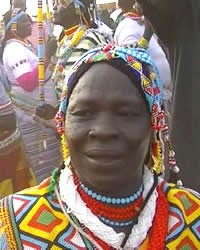Katcha-Kadugli in Sudan

Photo Source:
Kagu Abushanab
|
Send Joshua Project a map of this people group.
|
| People Name: | Katcha-Kadugli |
| Country: | Sudan |
| 10/40 Window: | Yes |
| Population: | 98,000 |
| World Population: | 98,000 |
| Primary Language: | Katcha-Kadugli-Miri |
| Primary Religion: | Ethnic Religions |
| Christian Adherents: | 25.00 % |
| Evangelicals: | 25.00 % |
| Scripture: | New Testament |
| Ministry Resources: | Yes |
| Jesus Film: | Yes |
| Audio Recordings: | Yes |
| People Cluster: | Nuba Mountains |
| Affinity Bloc: | Sub-Saharan Peoples |
| Progress Level: |
|
Introduction / History
The Katcha people are descended from the largest clan of Kadugli in central Sudan and reside south of the Kordofan Province. Their language is called Katcha or sometimes Tolubi. A few also speak Arabic, which is the national language in Sudan.
What Are Their Lives Like?
The Katcha keep cattle and farm. Most of their diet consists of what they grow and meat from livestock. For income they sell groundnuts, sim sim and sometimes cattle. Some migrate outside of their villages into towns and cities to work. It has been said that even when a Katcha is away, his heart and mind are still back home. Their family structure consists of the extended family in which the husband's clan members reside with the family. In a polygamous marriage, all the wives live within the same compound but each has her separate hut in which she lives with her children. It is a sign of wealth for a man to have multiple wives.Katcha people enjoy socializing and get along well with their own group and with neighboring people. They rely on one another for protection. Authority among the Katcha rests upon the clan elders that have been elected by the Katcha. Punishment depends on the crime committed and is decided in accordance with the government laws.
What Are Their Beliefs?
Tradition is critical to the Katcha, and they hold firmly to it. They are not very receptive to those who try to change their culture. The Katcha are predominantly pagan and many religious practices form the basis for their culture.
What Are Their Needs?
They are not likely to accept the Gospel unless it is explained to them in their own language. Christianity is considered a foreign religion because it has not been presented in their own language and social context.
Prayer Points
Pray that soon they will become Christ's ambassadors to disciple less-reached nations.Pray for the Lord to bless Katcha Christian believers with an abundance of God's love, joy, and kindness, drawing others to the King of kings.Pray for them to be grateful for God's spiritual and physical provisions.Pray for the Holy Spirit to move powerfully in such a way that they will become a light to those who still lack a relationship with Jesus Christ.